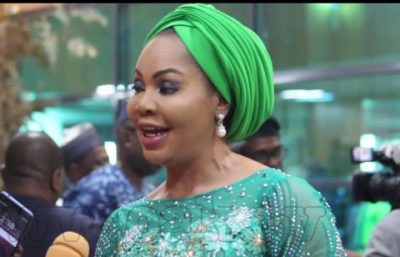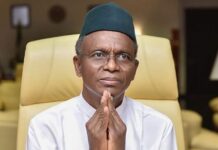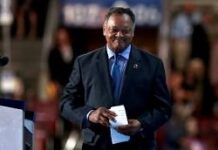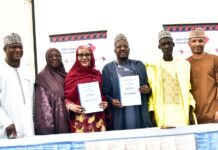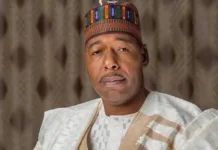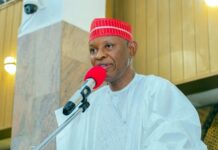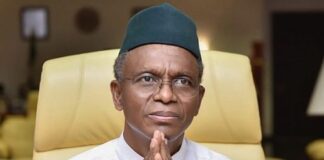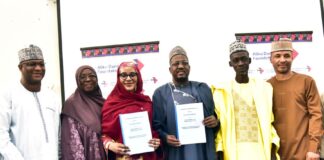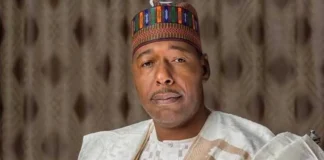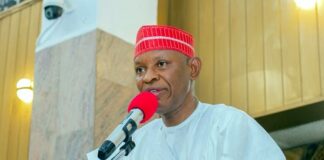A female member of the Federal House of Representatives, Nkeiruka Onyejeocha, has declared her intention to contest for the seat of the Speaker.
Onyejeocha, who represents Isuikwuato/Umunneochi Federal Constituency of Abia State, announced this at a press conference on Tuesday in Abuja.
She made the declaration despite the resolved of the leadership of her party, the All Progressives Congress (APC), to support the bid of the House Leader, Mr Femi Gbajabiamila, to emerge as the Speaker in the Ninth National Assembly.
The lawmaker who is the House Committee Chairperson on Aviation explained that she took the decision as a result of the concerns of the people of the south-east region, regarding the distribution of presiding officers’ positions in the National Assembly.
According to her, the people are worried that an inequitable distribution will create lopsidedness and lead to worsened divides in the country.
Onyejeocha also called on the APC leadership to fulfil its promise to Nigerians that it would increase women participation in the governance of the country.
She noted that she has been a member of the House for more than 11 years and has served her constituents and Nigeria diligently and with distinction.
The lawmaker said she sponsored several motions and bills, conducted oversight over multiple activities and initiatives of government, ministries, departments and agencies, as well as helped deliver meaningful constituency projects to the people of her constituency.
She, therefore, vowed that if elected as Speaker, she would improve the communications with Nigerians, as well as strengthen internal communications and relationships among members of the House.
Onyejeocha also promised to strengthen House Committees and Processes, as well as adopt a Legislative Agenda with a clear framework for compliance and monitoring, among others.
Read her full speech below:
I will like to welcome you to this media briefing called by me to apprise you of my preparedness to continue to offer my services to Nigeria, having been elected for the fourth term as a Member of the House of Representatives representing Isuikwuato/Umunneochi Federal Constituency of Abia State.
In my over 11 years of being a Member of the House of Representatives, I have served my Constituents and Nigeria diligently and with distinction. I have sponsored several motions and bills, conducted oversight over multiple activities and initiatives of government, ministries, departments, and agencies and helped deliver meaningful constituency projects to the people of Isuikwuato/Umunneochi Federal Constituency of Abia State that I represent.
I have chaired very important Committees of the House of Representatives, including the Committees of Aviation and Women in Parliament. As the Chairperson of the Aviation Committee of the House for two Sessions now, I oversighted the successful building of the New International Airport Terminal in Abuja, as well as the remodeling and renovation of several other airports and runways across the country.
I believe that I am very well equipped with the knowledge, experience, and integrity needed to manage bigger responsibilities.
It is in the light of this, that I Offer myself for consideration by my Colleagues for A higher responsibility as a Presiding Officer and Speaker of the House of Representatives of the 9th National Assembly.
As a Member of the All Progressive Congress (APC), who struggled against all odds to win a re-election under very difficult circumstances in Abia State, I believe that my party, the APC has a lot to do to help consolidate on the significant victory that the party recorded in winning this House of Representatives seat in Abia State, where my party has made important gains in its electoral fortune in the South East of Nigeria.
I know that my party has stated indications as to how it would like to see the distribution of key National Assembly leadership positions, it is, however, important to point out the concerns of my people of the South East Geo-Political Zone. We are worried that an inequitable distribution of presiding officers’ positions in the National Assembly, would exacerbate the current deep divides in the country, worsen the sense of marginalisation of the South East in Nigeria and create a lopsidedness in the distribution of the top 6 positions in the country.
With the North West and South West already taking the first two most important political positions in the country, of President and Vice-President, it would be equitable that the next four positions of Senate President, Speaker, Deputy Senate President, and Deputy Speaker, be shared equitably among the remaining four geopolitical zones of North East, North Central, South East, and South-South.
The message from my people of the South East geopolitical zone of Nigeria is that they demand equity in representation.
I also think that as a woman, who has distinguished herself and contributed immensely to the development of Nigeria and to the good political and electoral fortunes of my party, the APC, in the South East, leading to our emergence as the party of choice at the national level, the APC should use the opportunity of my expression of interest in the position of Speaker of the House of Representatives to fulfill its promise to Nigerians, that it would increase women participation in the governance of the country.
In presenting myself for the position of Speaker, I commit to
• Improved Communications with the General Public
First and foremost, we are here because of the people we represent. We are elected Representatives and were put here to serve Nigerian citizens. It is often said and I believe that the legislature is the only arm of Government that is closest to the people. Since the legitimacy of our mandate as members is dependent on the people and their continued support is necessary for us to achieve our constitutional responsibilities, it is important that we, as a collective body, embrace and enhance our relationship and engagement with them- bearing in mind that four years from now – which from my experience is usually closer than it seems – we would be called to account for our stewardship.
Consequently, I will lead the drive to facilitate a better understanding of the legislature and bridge the communication gap between the Nigerian Legislature and citizens. This way Nigerians will better understand the role of the legislative arm of government and work with us for better accountability and responsiveness. In addition, I will strive to ensure that we adopt a public communications strategy and process that will keep Nigerians informed of the work, activities, accomplishments, and challenges of the National Assembly.
Some of the methods in which we will accomplish this will include the use of modern information technology to improve virtual access to NASS, as well as joint discussions and decisions with our bureaucrats on improving citizens’ physical access to NASS, while at the same time, maintaining much-needed security.
As members, we cannot ignore the false or negative perceptions we as legislators continually battle. There is however another saying that “One’s understanding is correlative to their perception” which for me implies that perceptions can always be corrected to improve understanding.
- Improved Internal Communications and Members Relationships
From my experience, I have learned that our relationships within the House impact our work and effectiveness. Consequently, I will run an inclusive, responsive, and transparent leadership to foster harmony in the House. I will ensure that as much as possible, there is a conducive environment for legislative work and collaboration across party and ideological lines. I will work with my fellow members of this Honorable 9th Assembly to uphold the equality of members and their rights to make contributions on the floor of the house. This would include ensuring that every member irrespective of rank is treated with dignity and respect.
Feedback from members has always revealed that low capacity and unavailable resources are some of the major challenges to members’ legislative work. We will, therefore, work to the best of our ability to ensure that members’ skills and knowledge base is enhanced via capacity building opportunities both home and abroad and that members and committees have the human and material resources they need to accomplish their legislative tasks.
On this issue, I shall also pursue the following:
• Encourage Members to work together effectively in an atmosphere
of trust, understanding, and respect.
• Encourage consensus building and promote efforts to negotiate differences and find compromises to differences across party lines
• Treat new members with respect and uphold the equality of every member.
• Ensure that the Speaker’s office is responsive to members’ welfare and concerns.
• Improve internal communications facilities. In relation to this, I will
make deliberate efforts to scale up the ICT platforms for better and more efficient communication within and outside the House. The e-parliament platform promised in previous Assemblies will be fully realised.
- Adoption of a Legislative Agenda with clear framework for compliance and monitoring
Since the 7th House of Representatives, we have adopted a legislative agenda to guide our work. These agendas contain the priorities and commitments to be achieved before the end of the tenure of the House. I must say that this has been a wonderful initiative by the House which I intend to continue and improve upon. While we have made great strides towards accomplishing our 8th House Agenda, there are still gaps especially with respect to tracking compliance by committees and monitoring of results.
I will begin by engaging various stakeholders to seek their input to ensure that the agenda for the 9th House is even more robust and promising. Such engagements and consultations are key for agenda setting and obtaining ownership, buy-in, and support from the citizens we represent. I will ensure that our legislative goals are SMART (specific, measurable, attainable, realistic and timely) and I will set up a committee to monitor implementation, compliance, and tracking of our Legislative Agenda goals.
- Improved Lawmaking
• Conclusion of outstanding Priority Bills from the 8th House of
Representatives.
A number of key reform bills were proposed, considered and passed in the 8th House of Representatives. Chief amongst them are the constitution amendment bills which contained significant amendments such as financial independence for our counterpart in the States i.e. State Assemblies. The successful adoption of these laws and their assent into law was indeed a milestone moment for the 8th Assembly, unfortunately, a number of some other constitution amendments were not assented to while some other key reform bills were not concluded or adopted by the 8th House with its term running out. These include bills such as:
• the Police Reform Bill,
• Petroleum Industry and Governance Bill (PIGB),
• Universal Basic Education Act amendment bill,
• the National Assembly Budget and Research Office (NABRO) Bill,
• Audit Bill,
• Witness Protection Programme Bill etc.
There were also many bills touching on security, employment, improvement of the business environment, etc. that were either not concluded or vetoed. I will work to ensure that these bills are revisited. First of all, I will ensure that in the early session of the 9th NASS, we will work to adopt a common position on what bills are priority and should be included in the Legislative Agenda and then set a timeframe for achieving their passage.
In relation to this, we will continue to ensure citizen participation and access like we have always done in our law-making by facilitating citizens input on bills via public hearings and stakeholder consultations. We also work with the NASS bureaucracy to revive legislative scrutiny of bills. It has been observed that often times, several bills touching on the same subject matter, having cross-cutting or overlapping objectives with existing legislation or not aligning with the executive’s overall policy goals or the country’s international commitments are proposed and adopted without adequate scrutiny. To ensure that there is consistency and coherence in our lawmaking, we will work with our bureaucrats and external experts as needed, to obtain sound advice and direction on these issues so as to scale up the quality of bills adopted; to ensure that time for deliberation is apportioned to the most important issues; and most importantly, to ensure that our legislative outputs are in conformity with our Legislative Agenda and the executive’s as well.
To further accomplish this, I will pursue a robust and cooperative relationship with the Executive so that we are both on the same page while maintaining the independence and autonomy of the House of Representatives.
- Constitution and Electoral Reform;
The 8th National Assembly passed widely acclaimed alterations to the 1999 Constitution. Examples include alterations that provided for reduction in age to key elective offices, stipulating timelines for determination of pre-election matters and granting financial autonomy to state legislatures. The 8th Assembly also adopted far-reaching and progressive Electoral Act amendments, however, this progress was truncated by the refusal of Presidential assent to the bill. Following experiences from the just concluded general elections, it is agreed by stakeholders that electoral reforms have become even more pressing. We will, therefore, initiate the process of revisiting these issues and ensuring that they get concluded as early as possible within the life of the 9th Assembly. - Security Sector Reform; Nigeria is today faced with security challenges. I will work with colleagues in the House to support and intensify support to the executive arm of government and our gallant men and women in the Police, Army and other security services to enable them to be better able to respond to current national security challenges. I plan to work with you to ensure that the Legislative Agenda of the 9th House contains a clear strategy to improve the security situation of citizens. We will ensure that our bills and oversight effectively respond to security challenges, comply with best practices on security sector reform, and are in the best interest and security of Nigerians.
- Improved legislative oversight:
Oversight is an important duty and power we have been given by the Constitution. Our oversight of executive programmes and activities is acknowledged by all as being critical to effective performance and good governance in Nigeria. While I believe the 8th NASS accomplished a lot with respect to oversight, more work needs to be done.
For instance, our experience as members has been that often times, we have not performed this role optimally due to our “self-censorship” in other to avoid rocking the boat.
The result is that by so doing, we unwittingly contribute to the perpetuation of weak and unaccountable executive institutions. Furthermore, there have been instances where the legislature’s input is not sought in the development of government programmes or policies even though we are eventually approached and expected to approve funds for the execution of same.
As the arm of government that is closest to the people, we are better placed to contribute to this process and I will strive to ensure that we enhance relationships with the executive to bring about collaboration in policy and programme development that is dependent on public funds.
A concomitant responsibility here is to ensure that funds that we have appropriated are used for what they are meant for. Consequently, I will work to ensure that our oversight powers are fully utilised to detect waste, corruption, incompetence and misuse of public funds. I realize that this requires that our committees are better strengthened and adequately resourced.
- Strengthened House Committees and Processes
If I am elected as Speaker, I would work collectively with my fellow members to ensure that our committees’ structure and processes are strengthened for better effectiveness and optimum delivery. I will begin by ensuring that members’ assignment to committees is based on competence, strength and knowledge, taking into cognisance their interest and appreciation of the subject matter or committee’s jurisdiction and their willingness to apply themselves to the task at hand. I will also work with members and the bureaucracy to ensure that Clerks and Committees are well matched, so that their skills are mutually reinforcing.
Another way I will work to strengthen our committee processes is through enforcing the adoption of well-articulated work plans by committees to direct their operations; as well as enforcing the use of monitoring and evaluation (M&E) tools to assess our work and document lessons learned.
In consultation with our colleagues in the Senate, I would encourage:
a) Joint oversight hearings on programmes and agencies, as well as joint public hearings where necessary,
b) Oversight collaboration, cooperation, and timely information sharing
between Committees in the House and with Senate counterparts on budgetary and other legislative activities.
c) Streamlining activities of Committees to promote coordination and avoid duplication and conflict.
To further strengthen committee work, I will work with the NASS management/
bureaucracy to improve the physical working conditions in the House, including the purchase of necessary work tools and equipment for members and support staff.
To ensure that our chamber is truly a modern-day chamber; one that is comparable to other parliaments in advanced democracies, I will pursue the use of ICT in the daily conduct of legislative activities of the House, including developing the e-parliament platform that was promised in the 8th Assembly Legislative Agenda but not fully delivered. I will aim to achieve an efficient and electronically based chamber that meets the expectation of members, staff and is in line with international standards.
On a final note, dear colleagues, it is our job as legislators to perform our duties with an eye on the long-term future, to look over the horizon beyond the next election, beyond party, religious and ethnic affiliations and ensure that as best as we can, the decisions we make today will make Nigeria a better place for our children and for future generations to live in.
I promise to work with you to accomplish this using this privileged platforms that we have been given to ensure that the effectiveness of the House of Representatives and its duty to promote good governance for citizens is strengthened.
With our joint effort and collaboration, we can work to build on the successes of our predecessors to promote the independence of the House and the National Assembly at large and reinforce its status as a pillar of democracy and the “People’s Institution”.
Thank you.
Hon. Nkeiruka C. Onyejeocha
Chairman, House Committee on Aviation

